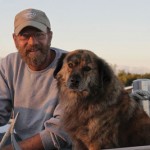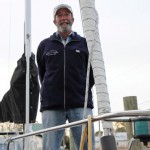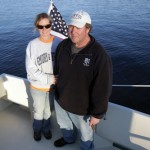Mitch has been kind enough to let us republish a recent series of articles he wrote that are at the Observer News. I have included a link back to the original article on the Observer News website at the bottom of the article here.
Helping Hands
The circus has moved down the road. All along the way, I’ve heard stories of the southbound cruising fleet crowding bridges and marinas along the Intracoastal Waterway bound for Florida, the Bahamas and Caribbean; but by the time I arrived the marinas were empty. It’s spooky being the only one aboard in a marina, but it turns out there are a few people even crazier than me still in the Chesapeake. I feel sorry for them — and I feel a certain joy in knowing that I am out of that beautiful, but boisterous, body of water.
On my first full day in the ICW, I had the waterway to myself for hours. It was calm and stunningly beautiful with late fall colors still lingering in the trees that thickly lined the shore. By late morning a trawler slowly passed, followed by a larger and faster sailboat. I’m not pushing Shadow Marie too hard. She has been seriously neglected for the past 10 years and I’m not anxious to find her breaking point in the Middle of Nowhere, North Carolina.
I was tied to an 800-foot long dock that ran along the ICW in an outpost named Coinjock. There were two boats sharing the dock with Shadow Marie, but neither had anyone aboard and it appeared they represented dreams either interrupted or shattered. Captain Mark Goodbrand was working at the Midway Marina. He said that just a month ago boats were tied to the dock like jigsaw puzzle pieces. I looked around the deserted place at dusk and could almost hear the echoes of the laughter and merriment of the crowd, all headed south for adventures in the tropics. But there were only echoes left and by nightfall, I had the place to myself.
The next morning, I motored into diminishing fog to continue the quest for sunshine and warmer weather. My sails went up for a beautiful cruise across the wide body of water known as Albemarle Sound. Haze and distance obscured the shorelines and, for a few hours, it felt as though I were in the middle of the ocean with no land in sight.
Alligator River Bridge, this is Shadow Marie. I’m a southbound sailboat approaching for your next opening.
Click.
This is Alligator River Bridge. Keep it comin’, captain. I’ll get you through.
As the bridge loomed larger and larger on my horizon, I could see the cars and big trucks flying across it. On the radar screen, it looked as though I was sailing into a brick wall. The bridge tender said to keep it coming — and bridge tenders know what they are doing. Finally, mercifully, as I drew closer to the bridge, the gates went down over the roadway bringing the cars and trucks to a stop.
Keep it comin’, captain.
Again mercifully, daylight started to show as the bridge slowly swung open. I kept it comin’ and well before I arrived at the channel, the bridge was wide open.
Ten miles or so from that bridge there is an anchorage in the Alligator River of North Carolina that is completely isolated from the world. There are no lights on the horizon save for the anchor lights of two sailboats about a half-mile off; no homes, not even the blinking lights of radio or cellular antennas. I stopped in this place, anchored in eight feet of water next to nothing at all, because only professionals on tugboats and insane people attempt to navigate the ICW at night. Since I’m neither, that means when it gets dark, I stop.
I was cut off from everything just a few hundred yards south of the Intracoastal Waterway. There was no cellular phone coverage and no MiFi hotspot to connect to the Internet. The quiet of such a place might have been deafening, but for the fighter jets that served to remind me that civilization was not far away.
The two jets circled low over the wide river — very low. In daylight, the fast planes were so far ahead of their noise that they were easy to hear but difficult to see. Once night fell, it was easy to see their navigation lights glowing and I watched as the two pilots performed an incredible mid-air ballet, sometimes simply circling, other times streaking towards each other. The jets were low enough for me to see the orange glow of their engines. The noise in that fascinating ballet eased the deafening quiet, allowing me to run the little generator that powers my electric blanket without concern for disturbing the peace in this remote place. I prayed for calm winds so I could sleep without too much worry about the anchor dragging.
I awoke the next morning to a passing squall and a cold drizzle. The sunrise was visible only as a dim orange glow for a few minutes and then dark clouds snuffed even that out. There was something ominous in the air as I started the engine and motored away from that beautiful but desolate place. I was bound for the small community of Belhaven, North Carolina, a journey that would take me through a 22-mile-long canal known as a land cut. The sun burned away the haze while I was in the protected confines of the land cut and for the first time in days, I was able to remove my heavy winter jacket. Somewhere past the halfway point, I noticed the treetops were bending over to a strong wind that I could not feel in the narrow waterway.
As I left the protection of the land cut for the wide expanse of the Pungo River, winds gusting over 30-miles-per-hour and short choppy waves buffeted the boat, and Shadow Marie heeled over despite having no sails up. The conditions weren’t dangerous, but they certainly weren’t pleasant. My main concern was with my destination for the evening. From a look at the chart, I could see that the marina where I had a slip reserved would be totally exposed to the wind and the waves. Cell phone service was still spotty but I managed to make a call to my wife, Michelle, to ask if she could call the marina to check conditions there. They told her that I was to go to the fuel dock and that people would be waiting.
I literally surfed into the marina and what I saw stabbed fear into my heart. The fuel dock was the outermost dock in the marina and the waves were crashing into it. There were a half dozen people on the dock motioning me towards them, but every instinct I had told me to turn off, to anchor off the marina in a slightly more protected place. I could see the hulk of a sailboat that had been driven up into the marshes from a previous storm and that was enough to make anchoring a questionable action. And so I surfed up to the dock, hitting hard reverse, stopping the boat with inches to spare as a dozen hands reached out to grab the lines, trying to steady the boat and, most importantly, to keep Shadow Marie from crashing into the dock.
I wanted to get out of there, but knew there was no way I was going to turn this 18,000-pound boat around in such a strong wind. For better or worse, I was trapped against that dock until the wind diminished. The chaos on the dock continued for an hour as a spider web of lines was formed to keep Shadow Marie tied down. Fenders (large rubber bumpers) were squeezed in to protect the hull of my boat from the dock. John, a cruiser from Canada and the unofficial dock master for the marina, spent much of his afternoon working with me to protect my boat.
It became an odd sort of roller coaster ride. I was tied to the dock but the boat would rise and fall a few feet with each wave. As the boat would rise, another wave would smash into the bottom with a sickening boom. When the crowd returned to their boats, I was left lying on the deck with my legs pressed against the dock piling, pushing back the fenders as they popped out from the continuous motion. After an hour of that, I began to think that the best way to get home was at the nearest airport in a comfortable airplane. Just as I started to feel sorry for myself, Rick Bearden, on the Mary Elizabeth, stepped out onto the dock, reached over the lifelines to where I was lying on the deck, and handed me a hot cup of soup.
“I have a feeling you might need that,” he said.
Indeed I did. It was a lifesaver that not only warmed me physically and mentally, but it abruptly ended the self-pity I was beginning to drown in. After gobbling the soup down, his wife, Marybeth, came out onto the dock to ask if I’d like a grilled cheese sandwich to go with it. In the chaos of getting into the marina, I hadn’t noticed that Rick had spent a good hour helping to secure my boat. Now their generosity and concern for me, a complete stranger, touched my heart and raised my spirits.
After several hours, the boat was secured to the point where I could walk away for brief periods, only returning to push down the fenders that popped up from the bucking motion caused by the waves. John stopped by to invite me to an impromptu dinner that was going to be held that evening in the boater’s lounge. I was among several boats blown into the marina with the heavy weather, so the dinner was an opportunity to get to know each other and to get off our boats for a while. John said he was baking fresh bread.
At dinner, the wind howled outside in the darkness and I worried about my boat smashing up to the dock. The company was excellent, however, as was the food and John’s bread. Despite that, I excused myself early to return to “fender duty” on the boat. Eventually, I went down to the berth and fell into a fitful sleep.
By 3 a.m., the already bad conditions had deteriorated further with increasing winds and passing rainsqualls pelting the boat. Every 15 minutes I went out into the darkness and the howling wind to lie on the deck and push the fenders back down between the boat and the dock. Then I flopped back into the berth soaking wet knowing I would be out there to do it all again in another 15 minutes. When daylight broke the gloom, the winds began to clock around, slowly increasing the protection from land and decreasing the waves. By afternoon, whitecaps ripped down the river but the marina was as calm as a millpond.
I was having a problem with my depth sounder — a serious concern with the many shallow water places yet to come on the ICW — and had been asking around in the marina for advice. Fate being what it is, that afternoon I met Carl Cantrell. Carl is a marine electronics expert with many years of experience in that industry. He dropped what he was doing to come by my boat to troubleshoot the problem. He stripped wire and soldered, all the while talking about this and that, and before long, I had a depth sounder that worked 99 percent of the time, rather than less than 50 percent of the time. How can I possibly repay Carl for that? He saved me from untold hours of worry over running the boat aground and being stranded in the middle of nowhere.
How can I possibly repay John for spending an entire afternoon helping to secure my boat against the wind and waves? How can I repay him for finding extra fenders and boards that, in the end, saved my boat from being damaged against the dock? How can I repay him for his undemanding friendship and fresh baked bread?
How can I possibly repay Rick and Marybeth for restoring my spirits and nourishing both my mind and body when the first fleeting thoughts of giving up this quixotic quest entered my mind? How can I thank them for their generosity and concern?
Only hours before, I was a complete stranger to all of these people. Simply saying “thank you” doesn’t begin to express the gratitude I feel towards them. What they did represented so much more than the simple acts of making a hot cup of soup or fixing a depth sounder. They went out of their way to help me when they had no reason whatsoever to do so, and for it, they expected nothing in return. Over the past few days, I was feeling sorry for myself; believing that sailing alone was a burden that few could appreciate. Now I know that I’m not alone. Rick, Marybeth, Carl and John are exceptional people in this world — and they were there when I needed them. I am not alone.
The wind was gone, but there was ice on the deck the morning I departed Dowry Creek Marina in Belhaven. It was a chilly reminder that I need to get south as quickly as possible. Even more pressing, a day’s sail away in the city of Oriental, I have a date with a charming, young woman. To borrow from the Beatles, it has been a long, cold, lonely winter and it feels like years since it’s been clear. But now the ice is slowly melting.
http://www.theobservernews.com/news/front-page-news/664-helping-hands.html




Recent Comments